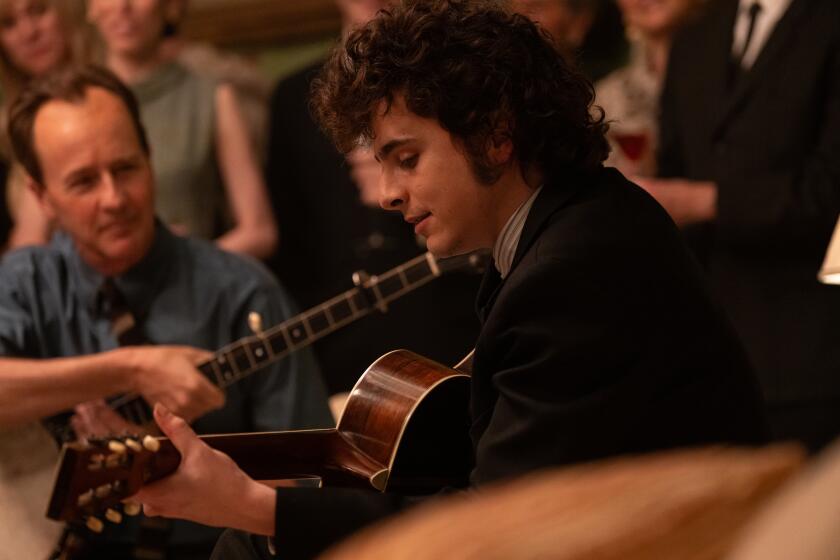Celebration of Chinese filmmaking at UCLA Film & Television Archive
How do you represent a hundred years of a nation’s moviemaking, especially when the country is one as vast and complex as China? In what it’s calling a “preliminary” sampling, the UCLA Film & Television Archive is offering Angelenos the chance to experience a striking array of selections of Chinese cinema, from the silent gems of Shanghai’s Golden Age to recently unearthed midcentury satires and more familiar art-house hits such as 2000’s “In the Mood for Love,” from Hong Kong auteur Wong Kar Wai.
Running Friday through Dec. 13, the 28-film series “A Century of Chinese Cinema” is a slimmed-down version of a program that premiered this year in Toronto, the result of an unprecedented collaboration among the China Film Archive (Beijing), the Hong Kong Film Archive and the Chinese Taipei Film Archive.
“I think a few well-chosen examples from the series will allow someone to take a very thrilling ride through China’s history as well as its artistic legacies,” said Shannon Kelley, UCLA Film & Television Archive’s head of public programs.
China’s film industry developed during decades riven by political turmoil and profound social change, and many of its well-known movies depict wartime strife, give voice to revolutionary fervor or espouse the tenets of socialist realism — often all at once.
But there are also important films addressing struggles of the internal sort rather than the epic. The series opens Friday with one such film, now considered among the greatest Chinese movies ever made.
“Spring in a Small Town” is an influential romantic drama whose restraint and evocative use of landscape feel decidedly modern. Jia Zhangke and Zhang Yimou are among the contemporary filmmakers who refer to it as a momentous work. Timing wasn’t auspicious for director Fei Mu, however; the movie was released in 1948, just before the Communists’ triumph. Because his delicate, nuanced tale wasn’t grounded in revolutionary doctrine, it was deemed reactionary and all but ignored for decades.
PHOTOS: Four Chinese directors to watch
The program’s varied range of overtly political features includes a film that has never before screened publicly in Los Angeles: 1951’s “Shangrao Concentration Camp.” Set in the 1940s during China’s civil war, it’s an unsparing portrayal of horrendous conditions, with a touch of purple prose. “It’s the big abattoir ruled by the imperialist lackeys,” on-screen text declares of the titular camp. Directors Zhang Ke and Sha Meng evoke the resilience and quiet ferocity of the downtrodden and rebellious, drumming up a big sense of drama in their condemnation of Chiang Kai-shek’s ruling Kuomintang, or Nationalist, party.
Pro-Communist patriotic spirit also fuels “The Big Road,” a 1935 drama in which unemployed youths undertake a road-building project to support the anti-Japanese resistance (Japan invaded Manchuria in the early 1930s). Director Sun Yu, a leading figure in Shanghai’s socially conscious cinema of the ‘30s, celebrates the collective spirit with fluent imagery and a Hollywood-esque interest in individuality (he was educated in the States).
And with its bold, graphic visual style, 1961’s “Red Detachment of Women” traces the transformation of an abused peasant girl into a disciplined, courageous Communist soldier. The movie is one of many in the series spotlighting the strength of women.
PHOTOS: Hollywood backlot moments
An Oct. 26 double feature showcases Ruan Lingyu, the so-called Greta Garbo of China and an icon of leftist cinema in the 1930s. “New Women” explores changing roles for women and casts a harsh glance at the tabloids, which would haunt Ruan off-screen (she committed suicide at age 24). In “The Goddess,” she plays a prostitute who’s raising a son, her valentine face as expressive as any ever committed to film.
Resilient women are also at the heart of such disparate films as “Street Angel,” with its charming and vivid depiction of Shanghai’s slums — and a sense of unity not predicated on ideology — and “Red Heroine,” a silent swordplay extravaganza in which the title character exacts revenge on villains by the score. It’s one of few surviving silent wuxia (martial arts) pictures.
The latter film shares a bill Saturday at the Billy Wilder Theater with two other silent rarities, complete with live musical accompaniment. The 1922 comedy short “Laborer’s Love,” vibrant with physical pranks and its working-class milieu, is the earliest title in the series and the earliest known film from China’s silent era that survives in its entirety.
PHOTOS: Celebrities by The Times
Rounding out the evening is 45 minutes of “Romance of the Western Chamber” — all that remains of the sumptuously designed 1927 costume drama.
Among other rarities on the schedule is the 1949 Hong Kong genre movie “Wong Fei-Hung: The Whip That Smacks the Candle.” In a departure from the fantasy-infused wuxia of the silent era, director Wu Pang presents kitchen-sink martial arts in ordinary, earthbound interiors. As Kelley noted, the film “came out of a tradition but transformed it.”
One of the most notable selections in the program, “Unfinished Comedy,” is a recently discovered satire that makes its Los Angeles debut Oct. 24. The 1957 film, which targets Communist Party orthodoxy, was completed the same year the People’s Republic banned satire. It was never released, and the hounded director, Lu Ban, never again made a film.
Whether the political slant is oblique or head-on, the artistry of the pictures in “A Century of Chinese Cinema” is extraordinary, ranging from dynamically filmed action sequences to the Gothic shadows of “Song at Midnight,” a 1937 spin on “The Phantom of the Opera” that’s considered China’s first horror movie. “Electrical charges,” Kelley said, “occur between films of different traditions,” and even this poetic dreamscape of a backstage melodrama manages to work in a political subtext: Its closing words emphasize the need to “work hard, to struggle, to fight our way out of the darkness.”
A complete schedule is available at www.cinema.ucla.edu.
More to Read
Only good movies
Get the Indie Focus newsletter, Mark Olsen's weekly guide to the world of cinema.
You may occasionally receive promotional content from the Los Angeles Times.











